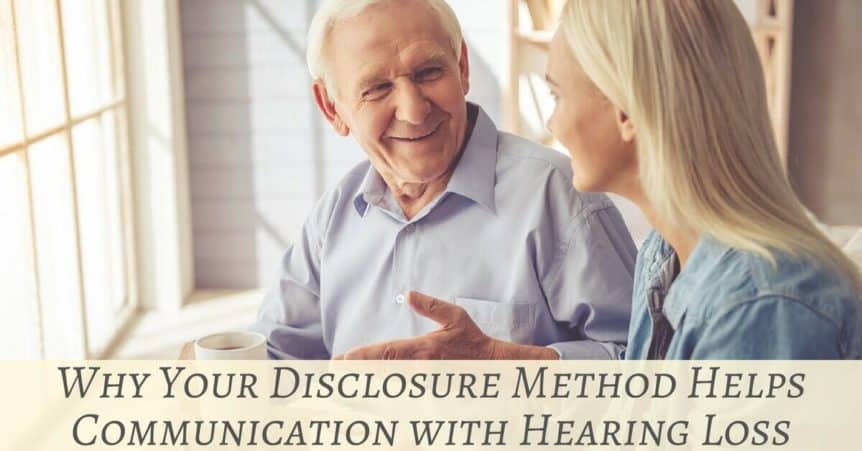- A Closer Look at Common Myths About Hearing Loss - May 7, 2024
- The Impact of Pets on Emotional and Hearing Health - April 26, 2024
- Strategies for Coping with Single-Sided Deafness - April 16, 2024
Have you been struggling with hearing loss for a while now? Are you afraid to talk to your loved ones about it? Maybe you’re worried they’ll treat you differently or start thinking of you as old. It might surprise you to learn that your disclosure method when it comes to talking about your hearing loss makes a big difference when it comes to communication. Pick the right disclosure method, and you’ll enjoy easy communication with lots of help from your loved ones, as well as great outcomes when it comes to your hearing health.
Disclosure Strategies
A recent study from Massachusetts Eye and Ear interviewed over 300 people to learn about their disclosure methods. They found that most people fell into one of three strategies when it came to talking about their hearing loss. Not only that, but the strategy they picked to deal with their hearing loss was able to predict how well they were able to communicate with hearing loss.
Non-Disclosers
Like the name suggests, people who were non-disclosers didn’t like to talk about their hearing loss. They avoided the topic altogether, and they didn’t have any good ways of dealing with their hearing loss. In fact, non-disclosers can come across as being rude, since they’re more likely to blame their hearing loss on someone else. They’ll use direct statements, like “I can’t hear you” or “speak up and stop mumbling!” rather than addressing their hearing loss. Non-disclosers don’t want to admit that they have difficulty hearing and aren’t really ready to deal with their hearing health. This means they’ll have a hard time communicating, and their disclosure, or rather non-disclosure, method will actually be making communication harder. Your loved ones may think you’re getting cranky and might not realize that when you answer sharply it’s because you’re struggling to hear.
Basis Disclosers
Basis disclosers do a bit better than non-disclosers and are sometimes willing to talk about their hearing loss. If you’re a basis discloser, you will tell the people closest to you that you are struggling to hear. You may ask people to speak up and will say thinks like “could you talk a little louder, I can’t quite hear what you said.” Basis disclosers receive some support from family and friends and enjoy slightly better communication.
Multipurpose Disclosers
The third disclosure method is multipurpose disclosers, and this group had the best communication with family and friends. Multipurpose disclosers are open about their hearing loss, and rather than just saying they can’t hear, they ask for specific accommodations. They turn down the background music, sit with their good ear facing the person speaking, ask to move to a quieter room, or switch seats as the dinner table. Being willing to ask for help, they have great communication, as their family and friends are eager to help where they can and know what makes it easier for them to hear. Before long, your family and friends will form communication habits that will help you hear better and help everyone communicate easily.
Choose the Right Disclosure Method
Multipurpose disclosers get a lot of help when it comes to communication, and it pays off. They are able to participate in activities they love, build strong relationships, and ask for accommodations that will help them hear. Women are more likely to be multipurpose disclosers and talk honestly and openly about their hearing loss. They enjoy the full support of family and friends, who include them in conversations, accompany them to audiologist appointments, and help them pick the perfect hearing device to get them back to hearing clearly. They also have better quality of life, and rate themselves as being happier than those who used other disclosure methods.
How a Hearing Aid Can Help
If you need to talk to your family about your hearing loss, be open with them, and choose to be a multipurpose discloser. Your loved ones will be happy to help you on your journey to easy communication. Once you have your family on board, visit us at New Leaf Hearing Clinic for a hearing assessment. Our staff of trained hearing specialists will test your hearing, and provide recommendations on the best hearing device to help you communicate with the people you love.

